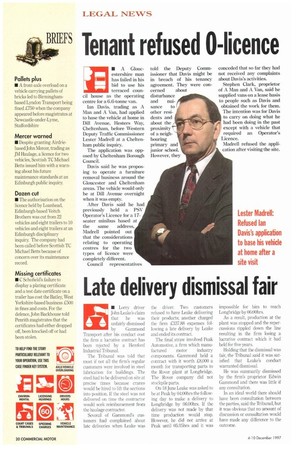Late delivery dismissal fair
Page 22

If you've noticed an error in this article please click here to report it so we can fix it.
• Lorry driver John Leake's claim AA that he was unfairly dismissed by (;ammond Transport after his conduct cost the firm a lucrative contract has been rejected by a Hereford Industrial Tribunal.
The Tribunal was told that most if not all the firm's regular customers were involved in steel fabrication for buildings. The steel had to be delivered on site at precise times because cranes would be hired to lift the sections into position. If the steel was not delivered on time the contractor would seek reimbursement from the haulage contractor.
Several of Gammond's customers had complained about late deliveries when Leake was the driver. Two customers refused to have Leake delivering their products; another charged the firm £33788 expenses following a late delivery by Leake and ended its contract.
The final, straw involved Peak Automotive, a firm which manu factured motor industry components. Gammond held a contract with it worth £8,000 a month for transporting parts to the Rover plant at Longbridge. The Rover company did not stockpile parts.
On 18 June Leake was asked to he at Peak by 04:00hrs the following day to make a delivery to Longbridge by 06:00hrs. If the delivery was not made by that time production would stop. However, he did not arrive at Peak until 05:15hrs and it was impossible for him to reach Longbridge by 06:00hrs.
As a result, production at the plant was stopped and the repercussions rippled down the line resulting in the firm losing a lucrative contract which it had held for five years.
Holding that the dismissal was fair, the Tribunal said it was satisfied that Leake's conduct warranted dismissal.
He was summarily dismissed by the firm's proprietor Edwin Gainmond and there was little if any consultation.
In an ideal world there should have been consultation between the parties, said the Tribunal, but it was obvious that no amount Of discussion or consultation would have made any difference to the outcome.
















































































































